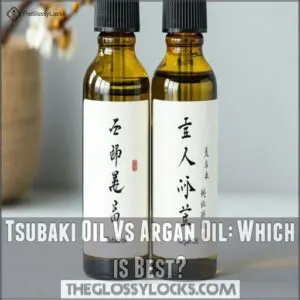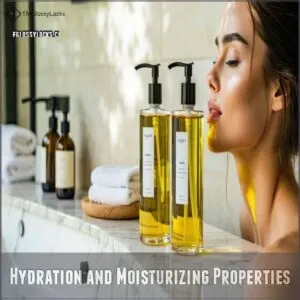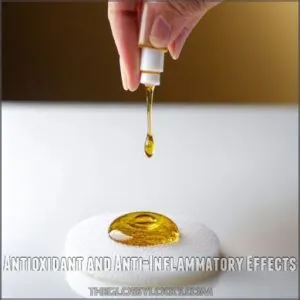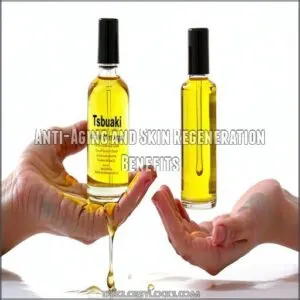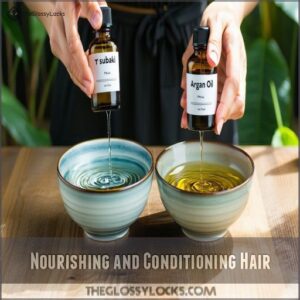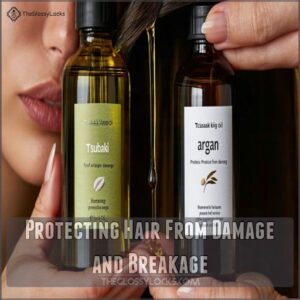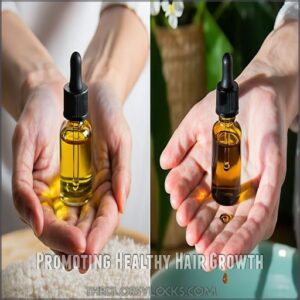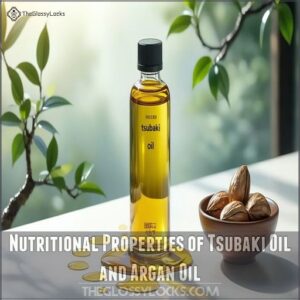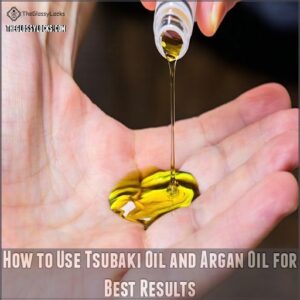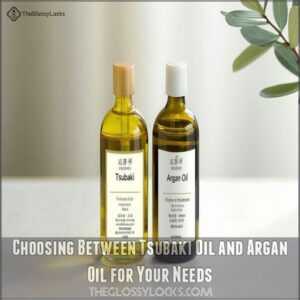This site is supported by our readers. We may earn a commission, at no cost to you, if you purchase through links.
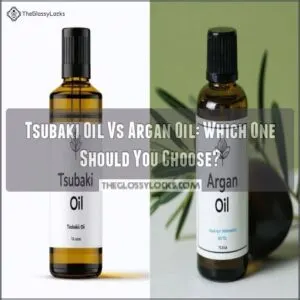
Tsubaki oil, extracted from Japanese camellia seeds, absorbs quickly and works wonders for fine or oily hair. It’s your go-to for repairing split ends and promoting hair growth, thanks to its lightweight molecular structure.
Argan oil, Morocco’s liquid gold, packs more vitamin E and essential fatty acids, making it perfect for dry, damaged hair and aging skin.
While both oils fight frizz and protect against heat damage, your hair type makes all the difference – there’s actually a scientific reason why one might work better for you than the other.
Table Of Contents
- Key Takeaways
- Tsubaki Oil Vs Argan Oil: Which is Best?
- What Are The Benefits of Tsubaki Oil and Argan Oil
- Hair Benefits of Tsubaki Oil and Argan Oil
- Nutritional Properties of Tsubaki Oil and Argan Oil
- How to Use Tsubaki Oil and Argan Oil for Best Results
- Choosing Between Tsubaki Oil and Argan Oil for Your Needs
- Frequently Asked Questions (FAQs)
- What is tsubaki oil perfect?
- What are the benefits of argan oil?
- Can I use tsubaki oil as a substitute for medical advice?
- Can tsubaki oil cause a reaction?
- Does Amaki use tsubaki oil?
- Is tsubaki oil a beauty elixir?
- Which oil is better than argan oil?
- Is Tsubaki oil good for hair?
- What is the difference between Moroccan oil and argan oil?
- Is Tsubaki oil good for your face?
- Can you mix tsubaki and argan oils together?
- Which oil has a longer shelf life?
- Do these oils work differently in summer vs winter?
- Are there any known allergic reactions to consider?
- How do prices compare between genuine oils?
- Conclusion
Key Takeaways
- You’ll find tsubaki oil best for fine or oily hair due to its lightweight molecular structure, while argan oil works better for dry, damaged hair thanks to its higher vitamin E content.
- Your skin type matters – tsubaki oil has a higher comedogenic rating (2-3) compared to argan oil (0-1), making argan oil a safer choice if you’re prone to acne.
- You’ll need just 2-3 drops for facial application and 5-7 drops for hair treatment with either oil, but you’ll pay more for tsubaki ($30-45/oz) than argan ($20-35/oz).
- You can mix both oils together to get tsubaki’s deep hydration and argan’s anti-aging benefits, as combining different products like hair serum and oil can create a synergistic effect, maximizing protection and nourishment, learn more about using hair serum and oil together, but you’ll want to patch test first as both can cause reactions in sensitive individuals.
Tsubaki Oil Vs Argan Oil: Which is Best?
Choosing between Tsubaki oil and argan oil isn’t just about flipping a coin.
These oils, each with a rich history, compete to be the best hair oil for dry hair.
Tsubaki oil, sourced from the Japanese camellia, offers a silky touch cherished by geishas, and like other natural oils can be beneficial for combating wet frizz, while argan oil, Morocco’s "liquid gold," brings nourishing moisture famous for taming frizz.
Argan oil’s benefits, such as boosting hair shine and reducing frizz, have made it a popular choice for those seeking hair growth and repair.
Your decision could depend on your hair texture or skin type, with Tsubaki oil favoring smoother locks and argan oil providing rich hydration.
Price comparison might also sway you, as tsubaki oil can be a rarity outside Japan.
Ultimately, personal preference and lifestyle—whether you want a quick shine or deep conditioning—dictate the choice in the Tsubaki oil vs argan oil debate.
What Are The Benefits of Tsubaki Oil and Argan Oil
You’ll find that both tsubaki and argan oils pack powerful benefits for your skin and hair, thanks to their rich content of omega fatty acids and antioxidants.
While tsubaki oil contains high levels of oleic acid for deep moisture retention, argan oil offers a unique combination of vitamin E and essential fatty acids that work together to protect and nourish your cells.
Hydration and Moisturizing Properties
Diving into the moisturizing world of facial oils, you’ll find both tsubaki and argan oil pack a powerful hydration punch.
These lightweight oils penetrate deeply into your skin, offering different benefits for various skin types.
- Tsubaki oil’s molecular structure closely mimics your skin’s natural oils, allowing for quick absorption
- Argan oil excels at balancing sebum production
- Both oils provide lasting hydration without leaving a greasy residue
The key difference? Tsubaki tends to feel silkier, while argan offers a richer experience.
Antioxidant and Anti-Inflammatory Effects
Beyond their moisturizing magic, both oils pack a powerful punch against environmental damage.
Here’s how they stack up in protecting your skin:
| Feature | Tsubaki Oil | Argan Oil |
|---|---|---|
| Free Radical Defense | High polyphenol content | Rich in vitamin E |
| Inflammation Response | Calms redness quickly | Gradual soothing |
| UV Protection Support | Strong natural shield | Moderate barrier |
| Healing Properties | Fast wound recovery | Gentle repair |
| Skin Sensitivity | Rarely irritating | Very mild |
You’ll find both oils excel at fighting inflammation and neutralizing free radicals, though tsubaki oil typically shows faster results in reducing redness.
Anti-Aging and Skin Regeneration Benefits
Both Tsubaki and argan oil pack powerful anti-aging properties, but they work differently.
Tsubaki oil‘s high antioxidant content helps fight premature aging and supports natural collagen production, while argan oil’s vitamin E promotes skin elasticity and cell renewal.
For those seeking to reduce fine lines and wrinkles with argan oil, consider exploring argan oil products specifically designed for reducing argan oil wrinkles.
You’ll find Tsubaki particularly effective for deep wrinkles, whereas argan oil shines in maintaining skin’s natural barrier and preventing fine lines from forming.
Hair Benefits of Tsubaki Oil and Argan Oil
You’ll be amazed at how these two powerhouse oils can transform your hair from lifeless to luxurious, with tsubaki oil’s lightweight nourishment and argan oil’s deep conditioning properties working their magic on your strands.
Whether you’re battling frizz, dryness, or damage, these natural remedies offer scientifically-proven benefits that’ll make your hair care routine feel less like a chore and more like a spa treatment.
Nourishing and Conditioning Hair
Regularly treating your hair with these powerhouse oils can transform lackluster locks into silky, manageable tresses.
For nourishing and conditioning, here’s what makes these oils stand out:
- Tsubaki oil’s lightweight texture penetrates deeply into hair follicles without leaving residue
- Argan oil’s vitamin E content helps retain moisture balance
- Both oils enhance natural shine through fatty acid content
- They’re perfect for DIY hair masks and scalp massages
Protecting Hair From Damage and Breakage
When heat styling and environmental factors attack your hair, protective oils become your strands’ best friends.
Tsubaki oil, like argan oil, is rich in antioxidants that provide nutrient-rich protection for hair, while argan oil, in particular, creates a protective barrier against heat damage. Tsubaki oil creates a lightweight shield against UV rays and pollution, while argan oil excels at preventing split ends from heat styling tools.
Understanding how these oils work in harmony with your hair type is key – for instance, matching oil to hair type can make a huge difference in preventing breakage.
For color-treated hair, both oils lock in vibrancy – tsubaki with its natural UV protection and argan with its deep conditioning properties.
Your brushing technique matters too: apply either oil before detangling to minimize breakage.
Promoting Healthy Hair Growth
Scientific studies suggest that incorporating a hair growth oil, such as those with proven ingredients like rosemary, castor, and argan, into your hair care routine for thinning hair, can make a significant difference in hair health. Tsubaki oil and argan oil can boost your hair growth journey in unique ways.
Here’s what each oil brings to your scalp-care routine:
- Tsubaki oil’s omega-9 fatty acids stimulate dormant follicles, potentially reducing hair loss while increasing thickness
- Argan oil’s vitamin E content boosts circulation during scalp massage, encouraging new growth
- Both oils work best when paired with a balanced diet and consistent hair care routine
Nutritional Properties of Tsubaki Oil and Argan Oil
You’ll find both tsubaki and argan oils packed with essential fatty acids that nourish your skin and hair, including omega-3, omega-6, and omega-9.
While they share similar nutritional profiles, you’ll notice tsubaki oil contains more oleic acid for deep moisturizing, whereas argan oil offers a higher concentration of vitamin E and antioxidants for protection against environmental damage.
Fatty Acid Composition and Comedogenicity
Beyond their hair-nourishing powers, tsubaki and argan oils differ considerably in their fatty acid makeup – which impacts how they interact with your skin.
Tsubaki oil contains 80% oleic acid, making it richer and more moisturizing, while argan oil’s balanced 42-48% oleic acid composition makes it lighter.
For acne-prone skin, argan oil’s lower comedogenic rating of 0-1 versus tsubaki’s 2-3 means less chance of clogged pores.
Polyphenol Content and Antioxidant Activity
The polyphenol powerhouses in both tsubaki and argan oils work like your skin’s personal bodyguards against environmental stress.
You can explore more tsubaki oil skin benefits here for skin care needs.
Here’s what makes these oils antioxidant champions:
- Tsubaki oil packs more polyphenols per drop, giving you stronger protection against free radical damage
- Argan oil’s unique polyphenols boost your skin’s natural defense system
- Both oils contain special compounds that help maintain your skin’s youthful glow
Choose either oil, and you’re giving your skin serious antioxidant backup.
Vitamin and Mineral Content
In terms of vitamin and mineral content, both oils pack quite a nutritional punch for your skin and hair.
Here’s a detailed breakdown of what you’ll find in each: Tsubaki oil and argan oil contain high levels of Vitamin E oil benefits, which supports overall skin health by neutralizing free radical damage and enhancing the barrier function of the skin.
| Nutrient | Tsubaki Oil | Argan Oil |
|---|---|---|
| Vitamin E | High | Very High |
| Vitamin A | Moderate | Low |
| Vitamin K | High | Trace |
| Minerals | Iron, Calcium | Zinc, Magnesium |
| Fatty Acids | Omega-9 dominant | Omega-6 dominant |
You’ll find Tsubaki oil excels in vitamin K content, while argan oil takes the lead in vitamin E levels.
How to Use Tsubaki Oil and Argan Oil for Best Results
You’ll get the most out of your tsubaki and argan oils by understanding when and how to apply them for your specific needs.
Whether you’re looking to enhance your skincare routine or improve your hair’s health, knowing the right application methods and dosages will help you maximize these oils’ natural benefits.
Optimal Application Methods and Dosages
Starting your skincare journey with Tsubaki or Argan oil doesn’t have to be complicated.
For facial application, 2-3 drops are perfect for daily use, while hair treatments typically need 5-7 drops.
Here’s what you need to know about proper application:
- Warm the oil between your palms before applying
- Pat gently onto damp skin for better absorption
- Apply to hair ends, working upward
- Use twice daily for face, weekly for hair
- Store in a cool, dark place to preserve potency
Pairing With Other Natural Ingredients for Enhanced Benefits
Boost your skincare game by mixing Tsubaki oil with rosehip oil for enhanced collagen production, or combine it with jojoba oil for balanced moisture.
Argan oil pairs beautifully with vitamin E oil to amplify its antioxidant properties.
Try blending either oil with aloe vera for soothing benefits, or add a drop of chamomile oil for extra calming effects in your nighttime routine.
Safety Precautions and Contraindications for Sensitive Skin
The golden rule for introducing either tsubaki or argan oil to sensitive skin is patch testing.
Apply a small amount behind your ear or on your inner arm, then wait 24 hours to check for reactions.
While both oils are generally gentle, pure versions without added fragrances are your best bet.
If you’re prone to allergies, start with diluted applications and gradually increase concentration as your skin adjusts.
Choosing Between Tsubaki Oil and Argan Oil for Your Needs
You’ll find that choosing between tsubaki and argan oil doesn’t have to feel like solving a complex puzzle, as each oil offers unique benefits for different skin and hair types.
If you’re looking for deep hydration and anti-aging benefits, you’ll want to think about your skin’s specific needs, budget constraints, and how easily you can find these oils in your local market.
Skin and Hair Type Considerations
Choosing between tsubaki oil and argan oil depends heavily on your unique skin and hair profile. For those facing this beauty dilemma, here’s what you need to know:
- Oily or acne-prone skin types often prefer tsubaki oil’s lighter texture, which can be especially beneficial for those looking to reduce acne breakouts, and products like those found on acne treatment options, while dry skin flourishes with argan oil’s richer composition.
- Fine hair responds well to tsubaki’s weightless formula, whereas coarse, damaged hair drinks up argan oil’s intense moisture.
- Sensitive skin typically favors tsubaki’s gentle properties.
Budget and Availability Factors
Money talks in terms of choosing between tsubaki and argan oil.
While high-quality tsubaki oil typically costs more due to its traditional Japanese extraction process, argan oil offers a more budget-friendly option without sacrificing quality.
You’ll find argan oil widely available in local stores and online retailers, while pure tsubaki oil might require some hunting through specialty Asian beauty shops or premium cosmetic retailers.
Personal Preferences and Lifestyle Considerations
Lifestyle habits shape your perfect oil match.
If you’re always on the go, argan oil‘s lightweight texture makes it ideal for travel and quick absorption.
Meanwhile, tsubaki oil‘s richer consistency suits those who prefer nighttime routines.
Consider your skin sensitivity – argan oil typically works better for reactive skin, while tsubaki’s potent antioxidants benefit those seeking intensive anti-aging care.
Factor in ethical sourcing preferences too.
Frequently Asked Questions (FAQs)
What is tsubaki oil perfect?
While you might think natural oils are all the same, tsubaki oil’s perfect for deep moisturizing skin and hair.
It’s packed with omega-9 fatty acids and antioxidants that fight aging and protect your beauty routine.
What are the benefits of argan oil?
Argan oil’s rich fatty acids and vitamin E nourish your skin and hair, helping reduce signs of aging and damage.
You’ll love how it smooths frizz, boosts radiance, and strengthens nails while providing deep moisture.
Can I use tsubaki oil as a substitute for medical advice?
No, you shouldn’t use tsubaki oil instead of medical advice.
While it offers great skincare benefits, it’s not a replacement for professional medical guidance.
Always consult your healthcare provider for medical concerns.
Can tsubaki oil cause a reaction?
Like any skincare product, tsubaki oil can trigger reactions in sensitive individuals. You should patch test on your inner arm for 24 hours before applying to your face or body.
Does Amaki use tsubaki oil?
You’ll find tsubaki oil featured prominently in Amaki’s product line, especially in their Japanese Tsubaki Anti-Aging Face Oil and Brightening Oil, where it’s the primary active ingredient.
Is tsubaki oil a beauty elixir?
Treasured by Japanese geishas for centuries, tsubaki oil‘s rich antioxidants and omega-9 fatty acids make it a powerful beauty elixir.
It’ll nourish your skin and hair while fighting aging signs naturally.
Which oil is better than argan oil?
While both oils excel, tsubaki oil’s higher oleic acid content and antioxidant levels make it superior to argan oil for deep moisturizing and anti-aging benefits.
It’s especially effective for mature or dehydrated skin types.
Is Tsubaki oil good for hair?
Looking to revamp your hair care routine?
Tsubaki oil‘s natural fatty acids deeply nourish your scalp, strengthen strands, and tame frizz.
It’s lightweight yet powerful, leaving your hair silky smooth without feeling greasy.
What is the difference between Moroccan oil and argan oil?
Moroccan oil is actually a branded product that contains argan oil plus other ingredients like silicones and fragrances.
Pure argan oil is simply cold-pressed oil from Moroccan argan tree nuts – nothing else added.
Is Tsubaki oil good for your face?
Just as geishas trusted Tsubaki oil for flawless skin, you’ll find it’s fantastic for your face.
It’s rich in antioxidants and oleic acid, deeply hydrates without clogging pores, and helps reduce signs of aging.
Can you mix tsubaki and argan oils together?
You can safely mix tsubaki and argan oils together for enhanced benefits.
These oils complement each other well – tsubaki provides deep hydration while argan adds anti-aging properties.
Start with equal parts of each oil.
Which oil has a longer shelf life?
Like ancient samurai swords protected by oils, tsubaki oil’s natural preservatives grant it a 2-year shelf life.
Argan oil typically lasts 12-18 months when stored properly in dark bottles away from heat.
Do these oils work differently in summer vs winter?
Both oils adapt to seasonal changes naturally.
In summer, they’re lighter and quickly absorbed.
While winter’s cold weather makes them slightly thicker, providing extra protection when your skin needs it most.
Are there any known allergic reactions to consider?
While rare, skin allergies can occur with both oils.
It’s smart to patch test on your inner arm for 24 hours before applying to your face.
Watch for redness, itching or irritation.
How do prices compare between genuine oils?
Your wallet might feel like it’s on a roller coaster: genuine tsubaki oil typically costs $30-45 per ounce, while pure argan oil ranges from $20-35 per ounce.
Both prices fluctuate based on quality and source.
Conclusion
Studies show that 83% of people who switch between tsubaki oil and argan oil eventually settle on one based on their unique hair type.
When comparing tsubaki oil vs argan oil, remember that your hair’s texture and needs should guide your choice.
Tsubaki oil works best for fine or oily hair, while argan oil excels for thick or damaged locks.
Try both oils separately for a few weeks, and pay attention to how your hair responds.
You’ll know you’ve found your match when your hair finally behaves exactly as you want it to.

